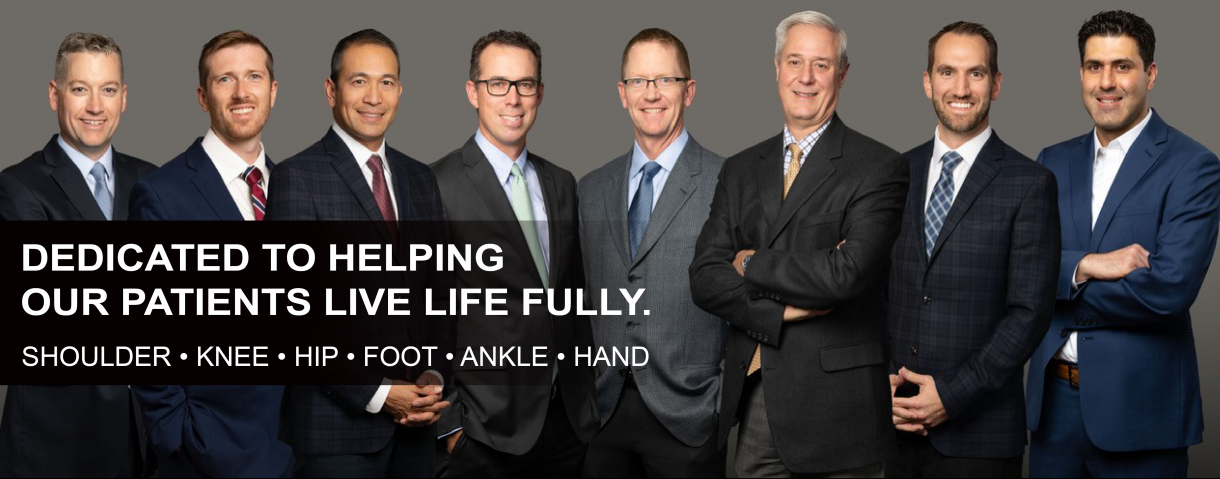By Leslie B. Vidal, M.D., Orthopedic Associates
Shoulder pain is an extremely common complaint. It can result from a specific injury or can develop insidiously over time. It is often aggravated by daily activities, and may ache at night preventing a good night’s sleep. Many causes of shoulder pain can be alleviated with activity modification, specific shoulder exercises and anti-inflammatory medications. It is important to make an accurate diagnosis of the cause of the symptoms so that it can be treated effectively. Some common causes of shoulder pain include impingement syndrome, rotator cuff tears, frozen shoulder and arthritis. Pain can be referred to the shoulder from a pinched nerve in the neck as well.
 The rotator cuff is the group of muscles that raise and rotate the arm at the shoulder. Rotator cuff problems range from tendonitis and bursitis to partial and full thickness rotator cuff tears. Rotator cuff pain is often located on the upper-outer arm. It is aggravated by overhead activities. Rotator cuff pain may be worse at night. Inflammation of the rotator cuff (tendonitis) and its bursa (bursitis) are referred to as “impingement syndrome”. Impingement syndrome results from a pinching of the rotator cuff tendons and bursa between the top of the humerus (arm bone) and the acromion (tip of the shoulder bone). This leads to thickening of the tendons, pain and poor function of the rotator cuff. With the thickening of the tendons in an already tight space, continued use of the arm can lead to a vicious cycle of progressive pain, poor cuff function and more thickening. Treatment is directed at decreasing the inflammation with an oral or injection of an anti-inflammatory medicine (corticosteroid injection) and improving the rotator cuff function, which serves to pull the humerus down and away from the acromion relieving the impingement. Rarely is surgery necessary to treat impingement syndrome.
The rotator cuff is the group of muscles that raise and rotate the arm at the shoulder. Rotator cuff problems range from tendonitis and bursitis to partial and full thickness rotator cuff tears. Rotator cuff pain is often located on the upper-outer arm. It is aggravated by overhead activities. Rotator cuff pain may be worse at night. Inflammation of the rotator cuff (tendonitis) and its bursa (bursitis) are referred to as “impingement syndrome”. Impingement syndrome results from a pinching of the rotator cuff tendons and bursa between the top of the humerus (arm bone) and the acromion (tip of the shoulder bone). This leads to thickening of the tendons, pain and poor function of the rotator cuff. With the thickening of the tendons in an already tight space, continued use of the arm can lead to a vicious cycle of progressive pain, poor cuff function and more thickening. Treatment is directed at decreasing the inflammation with an oral or injection of an anti-inflammatory medicine (corticosteroid injection) and improving the rotator cuff function, which serves to pull the humerus down and away from the acromion relieving the impingement. Rarely is surgery necessary to treat impingement syndrome.
Rotator cuff tears may result from a fall or direct injury to the shoulder or from repetitive use over time. They may present with upper arm pain and night pain, similar to impingement syndrome. However, rotator cuff tears are characterized by weakness, particularly when lifting objects overhead. Although rotator cuff tears will not heal on their own, not all rotator cuff tears need to be fixed surgically. In many cases they produce minimal to no symptoms, or symptoms that can be treated with anti-inflammatories and physical therapy. In cases where the tear is causing significant pain and dysfunction of the arm, surgery may be recommended. In most cases, rotator cuff repairs can be done in an outpatient setting and with arthroscopic (minimally invasive) techniques.
A less common cause of shoulder pain is adhesive capsulitis, also known as frozen shoulder. This is a condition that causes severe pain and significant restriction of motion in the shoulder. Most often the cause is unknown, but is seen more frequently in females between the ages of 40-60 and in association with endocrine disorders (diabetes, thyroid problems), and after shoulder trauma and / or surgery. Frozen shoulder is characterized by an early phase of progressive pain and stiffness, then a very stiff phase where pain begins to subside, then the thawing stage during which the motion improves slowly over a lengthy period of time. Treatment can expedite the resolution of symptoms significantly. In general, treatment involves oral anti-inflammatories and “pain free” physical therapy. Sometimes an injection of cortisone into the shoulder can be very effective in reducing inflammation and allowing the restoration of pain free range of motion.
Arthritis can affect the shoulder joint just as it affects other joints. Arthritis means that the cartilage that covers the ends of the bones has worn thin, and over time bone articulates with bone. The bones can deform in shape, flatten and develop bone spurs. This change leads to gradual loss of motion in the shoulder and progressive pain. Everyday activities become painful and difficult to perform. Treatment of shoulder arthritis begins with anti-inflammatories, physical therapy, injection therapy and activity modification. When these treatments fail to relieve symptoms, shoulder replacement surgery can be considered. When performed by an experienced shoulder surgeon, the outcomes generally yield predictable restoration of pain free range of motion and improvement in strength and function. Because the shoulder is not a weight bearing joint, such as the hip or knee, the longevity of a shoulder replacement is excellent.
Because there are many causes of shoulder pain, it is important to seek a diagnosis by an experienced clinician so that appropriate treatment can be initiated. Most shoulder pain can be effectively alleviated in a relatively short period of time.







Leave a Reply